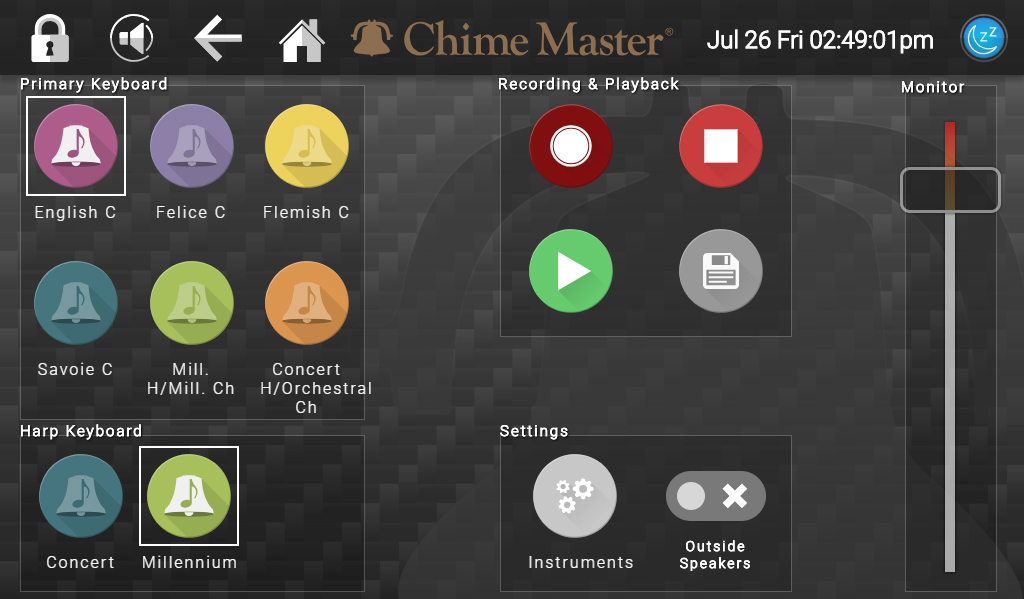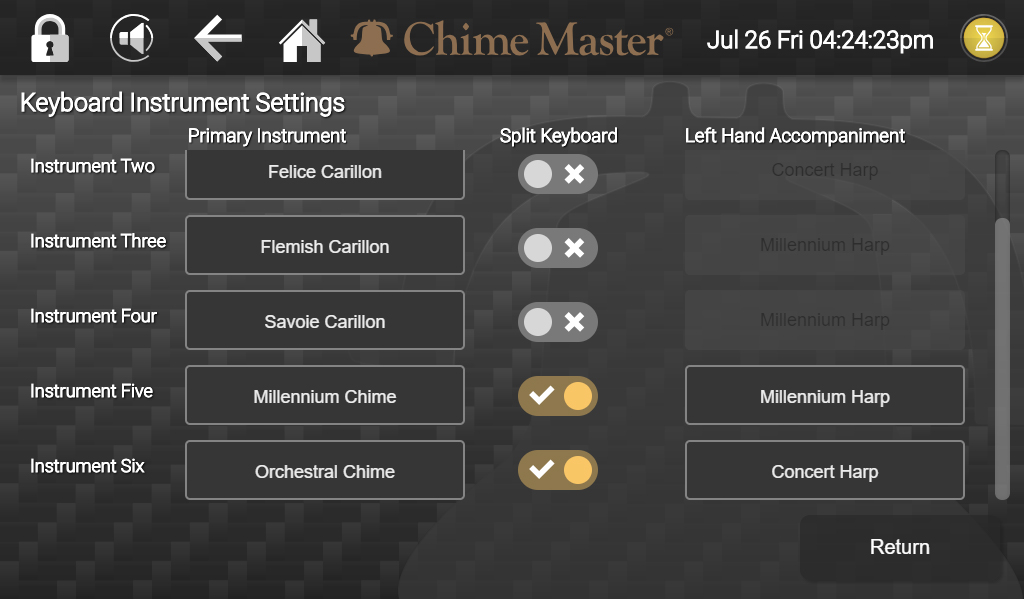Keyboard AX: Difference between revisions
Jodivandyke (talk | contribs) |
(1.4.20 outside zone setting.) |
||
| (35 intermediate revisions by 3 users not shown) | |||
| Line 1: | Line 1: | ||
<div style="font-size:84%">'''[[Chime_Master_Help|Help]] | <span class="crumbs"><div style="font-size:84%"> | ||
''' [[Remote_AX| | '''[[Chime_Master_Help|Help]] » [[Operating manuals]] » [[:Category:AX_Manual|AX Table of Contents]]'''<br/> | ||
''' [[Remote_AX|← Previous Section]] [[Schedule_AX|Next section →]] ''' | |||
</div></span> | |||
Keyboard performance and recording is supported on Millennium AX and Platinum AX models. | |||
This menu allows you to practice | This menu allows you to practice, record or perform live using your AX unit with your MIDI keyboard/controller. Opening this screen will cancel anything that is currently playing. Manually or automatically scheduled music is suspended while in this menu. | ||
== Keyboard | [[File:AX-KBscrn.jpg|frameless|center|600px]] | ||
The left side of the screen has | |||
== Keyboard screen == | |||
The left side of the screen has instrument selectors for up to two keyboards. On the right is a volume control slider for the inside monitor speakers only. The recording controls are in the middle of the page. At the bottom, in the Settings section, is an Instruments button to customize the instrument selectors and an outside speaker switch. | |||
The outside zone switch is off by factory default for practice mode. You can play a live performance by turning the outside speakers on. You may record while in practice or performance mode. When you review your recording with the Play button in the keyboard screen, the outside speakers are automatically muted. After tapping Play, you can manually turn on the outside speakers if you wish. You can change the default outside zone setting on the [[Keyboard_setup_AX#General_settings|Keyboard Settings]] page. | |||
=== Primary keyboard === | === Primary keyboard === | ||
Use buttons in the Primary keyboard section to select the active instrument. The active instrument will be highlighted. Instruments may be selected at any time, including while you are recording your performance. | |||
; Carillon instruments | |||
: All carillons span at least five octaves | |||
; Chime instruments | |||
: Most chime instruments span at least two octaves | |||
; Toll instruments | |||
: Most tolling instruments span at least one and a half octaves | |||
: Tolling instruments use heavy hammers and may not be suitable for music | |||
If you are using dual organ manuals, this melodic voice can be accompanied by a harp instrument on the secondary keyboard. If you would like an accompaniment instrument on a single split keyboard, use the split switch in the Instrument customization explained below. | |||
=== Harp keyboard === | === Harp keyboard === | ||
Harp instruments are provided for a second keyboard channel, typically an alternate organ manual. MIDI channels | ;Platinum AX only | ||
Harp instruments are provided for a second keyboard channel, typically an alternate organ manual. Set the MIDI channels for each organ manual in the [[Keyboard_setup_AX|Keyboard setup screen]] on the AX system settings menu (not the instrument settings). | |||
These buttons have no effect when using a single keyboard or organ manual. In Settings – Keyboard, the Harp Keyboard can be hidden if not used. | |||
;Harp instruments | |||
:Supplied harp instruments span five octaves | |||
=== Recording and playback === | === Recording and playback === | ||
In some versions, your recording will always play back using the voice you have selected during the recording regardless of other settings. | |||
To use the record feature, tap the record button (red button with round icon) to enable recording. Recording will begin when you play the first note. Tap the record button again to end the recording. You can listen to your recording before you save it by tapping the green play button; the red stop button will stop the playback. | To use the record feature, tap the record button (red button with round icon) to enable recording. Recording will begin when you play the first note. Tap the record button again to end the recording. You can listen to your recording before you save it by tapping the green play button; the red stop button will stop the playback. | ||
==== Arranging for carillon ==== | |||
While most church musicians are skilled in adapting SATB hymns suitably for piano or organ performances on the fly, church bells present a new challenge. To help you arrange your music to sound its best on bells, the [https://www.gcna.org/ GCNA]'s Ronald Barnes Memorial Grant sponsored Rachel Perfecto's online guide, [https://www.arrangingforcarillon.com/ Arranging for carillon]. | |||
==== Save recording ==== | ==== Save recording ==== | ||
If you wish to save your recording, tap the | If you wish to save your recording, tap the gray save button and type a title for your piece. If you do not wish to save your recording, simply record again. Any recording that is not saved and titled will be lost with the next recording. | ||
=== Instrument Customization === | |||
The six selectors for primary keyboard instruments can be re-assigned by tapping the Instruments button in the Settings section of the Keyboard page. Choose from over twenty available instruments for your lead or solo voice. For each button, you may choose to have either a solo instrument, or flip the switch to split the keyboard and then select an accompaniment harp instrument for the left hand. When you have made your choices, tap Return at the bottom of the page. The selector buttons will reflect your changes. | |||
[[File:AX-KB-inst.jpg|none|500px|left]] | [[File:AX-KB-inst.jpg|none|500px|left]] | ||
| Line 37: | Line 57: | ||
Refer to [[Keyboard_setup_AX|keyboard settings]] for instructions pertaining to keyboard hookup and channel setting. | Refer to [[Keyboard_setup_AX|keyboard settings]] for instructions pertaining to keyboard hookup and channel setting. | ||
<span class="crumbs"><div style="font-size:84%"> | |||
>''' [[Remote_AX|← Previous Section]] [[Schedule_AX|Next section →]] ''' | |||
</div></span> | |||
[[Category:AX Manual]] | [[Category:AX Manual]] | ||
Latest revision as of 16:53, 27 January 2025
Keyboard performance and recording is supported on Millennium AX and Platinum AX models.
This menu allows you to practice, record or perform live using your AX unit with your MIDI keyboard/controller. Opening this screen will cancel anything that is currently playing. Manually or automatically scheduled music is suspended while in this menu.
Keyboard screen
The left side of the screen has instrument selectors for up to two keyboards. On the right is a volume control slider for the inside monitor speakers only. The recording controls are in the middle of the page. At the bottom, in the Settings section, is an Instruments button to customize the instrument selectors and an outside speaker switch.
The outside zone switch is off by factory default for practice mode. You can play a live performance by turning the outside speakers on. You may record while in practice or performance mode. When you review your recording with the Play button in the keyboard screen, the outside speakers are automatically muted. After tapping Play, you can manually turn on the outside speakers if you wish. You can change the default outside zone setting on the Keyboard Settings page.
Primary keyboard
Use buttons in the Primary keyboard section to select the active instrument. The active instrument will be highlighted. Instruments may be selected at any time, including while you are recording your performance.
- Carillon instruments
- All carillons span at least five octaves
- Chime instruments
- Most chime instruments span at least two octaves
- Toll instruments
- Most tolling instruments span at least one and a half octaves
- Tolling instruments use heavy hammers and may not be suitable for music
If you are using dual organ manuals, this melodic voice can be accompanied by a harp instrument on the secondary keyboard. If you would like an accompaniment instrument on a single split keyboard, use the split switch in the Instrument customization explained below.
Harp keyboard
- Platinum AX only
Harp instruments are provided for a second keyboard channel, typically an alternate organ manual. Set the MIDI channels for each organ manual in the Keyboard setup screen on the AX system settings menu (not the instrument settings).
These buttons have no effect when using a single keyboard or organ manual. In Settings – Keyboard, the Harp Keyboard can be hidden if not used.
- Harp instruments
- Supplied harp instruments span five octaves
Recording and playback
In some versions, your recording will always play back using the voice you have selected during the recording regardless of other settings.
To use the record feature, tap the record button (red button with round icon) to enable recording. Recording will begin when you play the first note. Tap the record button again to end the recording. You can listen to your recording before you save it by tapping the green play button; the red stop button will stop the playback.
Arranging for carillon
While most church musicians are skilled in adapting SATB hymns suitably for piano or organ performances on the fly, church bells present a new challenge. To help you arrange your music to sound its best on bells, the GCNA's Ronald Barnes Memorial Grant sponsored Rachel Perfecto's online guide, Arranging for carillon.
Save recording
If you wish to save your recording, tap the gray save button and type a title for your piece. If you do not wish to save your recording, simply record again. Any recording that is not saved and titled will be lost with the next recording.
Instrument Customization
The six selectors for primary keyboard instruments can be re-assigned by tapping the Instruments button in the Settings section of the Keyboard page. Choose from over twenty available instruments for your lead or solo voice. For each button, you may choose to have either a solo instrument, or flip the switch to split the keyboard and then select an accompaniment harp instrument for the left hand. When you have made your choices, tap Return at the bottom of the page. The selector buttons will reflect your changes.
MIDI Channel settings
Refer to keyboard settings for instructions pertaining to keyboard hookup and channel setting.

